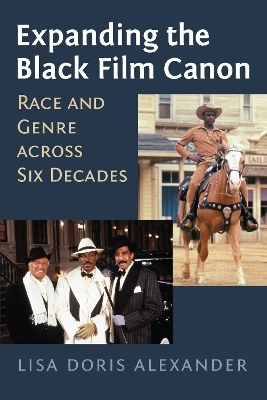
Expanding the Black Film Canon
University Press of Kansas (Verlag)
978-0-7006-2839-1 (ISBN)
If the sheer diversity of recent hits from Twelve Years a Slave and Moonlight to Get Out, Black Panther, and BlackkKlansman tells us anything, it might be that there’s no such thing as “black film” per se. This book is especially timely, then, in expanding our idea of what black films are and, going back to the 1960s, showing us new and interesting ways to understand them.
When critics and scholars write about films from the Blaxploitation movement—such as Cotton Comes to Harlem, Shaft, Superfly, and Cleopatra Jones—they emphasize their importance as films made for black Audiences. Consequently, Lisa Doris Alexander points out, a film like the highly popular, Oscar-nominated Blazing Saddles—costarring and co-written by Richard Pryor—is generally left out of the discussion because it doesn’t fit the profile of what a black film of the period should be. This is the kind of categorical thinking that Alexander seeks to broaden, looking at films from the 60s to the present day in the context of their time. Applying insights from black feminist thought and critical race theory to one film per decade, she analyzes what each can tell us about the status of black people and race relations in the United States at the time of its release.
By teasing out the importance of certain films excluded from the black film canon, Alexander hopes to expand that canon to include films typically relegated to the category of popular entertainment—and to show how these offer more nuanced representations of black characters even as they confront, negate, or parody the controlling images that have defined black filmic characters for decades.
Lisa Doris Alexander is associate professor of African American studies at Wayne State University. She is the author of When Baseball Isn’t White, Straight, and Male: The Media and Difference in the National Pastime.
Acknowledgments
Coming Attractions
1. I Ain't Fit to Live with No More: Nothing But a Man Revisited
2. "Hey, Where Are the White Women at?": The Presentation of Racism and Resistance in Blazing Saddles
3. Harlem Nights, Awkward Framing, and Complicated Gender Politics
4. Who's the Real Gangsta?: The Glass Shield and the Politics of Black Communities and Police Relations
5. "If You're Going to Tell People the Truth, Make Them Laugh": C.S.A.: The Confederate States of America as Mockumentary and Truth-Telling
6. Ladies First: Ava DuVernay and Black-Female-Centered Narratives
7. Who's the Hero of the Piece?: Hollywood's Representation of Jackie Robinson's Legacy
8. Are We Allowed to Be Children?: Black Teen Films, Trauma, and the Race to Adulthood
Post-Credit Sequence
Notes
Bibliography
Index
| Erscheinungsdatum | 29.08.2019 |
|---|---|
| Verlagsort | Kansas |
| Sprache | englisch |
| Maße | 152 x 226 mm |
| Gewicht | 525 g |
| Themenwelt | Kunst / Musik / Theater ► Film / TV |
| Kunst / Musik / Theater ► Theater / Ballett | |
| Geisteswissenschaften ► Geschichte ► Regional- / Ländergeschichte | |
| Sozialwissenschaften ► Ethnologie | |
| Sozialwissenschaften ► Kommunikation / Medien ► Medienwissenschaft | |
| Sozialwissenschaften ► Soziologie | |
| ISBN-10 | 0-7006-2839-8 / 0700628398 |
| ISBN-13 | 978-0-7006-2839-1 / 9780700628391 |
| Zustand | Neuware |
| Haben Sie eine Frage zum Produkt? |
aus dem Bereich


